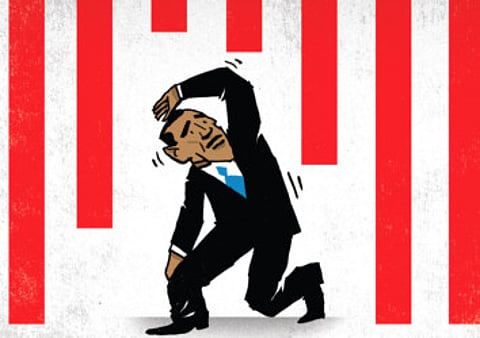Obama’s stature fast wilting
Obama’s dithering will cost America’s hierarchal top spot in global community

No leader can hope to please all the people all of the time, but these days, US President Barack Obama struggles to please some of the people some of the time. His judgement is being questioned at home, where the government has been forced into a partial shutdown and the raising of the debt ceiling is in doubt. The Republican Tea Party bears the brunt of the blame for holding the executive branch hostage. However, Obama is being criticised for his failure to schmooze with lawmakers in the way his predecessors have done and his unwillingness to negotiate in the face of a dire economic crisis whose ripples would be disastrous for the rest of the world.
US political analysts unfavourably compare his performance with Bill Clinton, who, during the 1995-96 government shutdown kept back-channels open for dialogue with his Republican protagonists and never ceased talking with Republican House Speaker Newt Gingrich. Countries only too aware that when Washington sneezes, they are in danger of catching a cold — as had occurred in 2008 — whose economies are still volatile, consider the US impasse grossly irresponsible.
Washington’s foreign policy is not in a good shape either. The neoconservatives — who drove George W. Bush into simultaneous multiple wars, dreamt of a ‘New American Century’ when the US would increasingly project power and influence overseas — must be bitterly disappointed. Obama has managed to fritter away goodwill from US traditional allies due to US breaches of international law and his own confusing policy U-turns that pull the rug from under America’s closest friends.
Edward Snowden’s revelations on US National Security Agency (NSA) spying have been particularly damaging, undermining trust. Brazil, whose regional clout has grown parallel with its economy, is a case in point. When President Dilma Roussef discovered that her emails and phone calls were being monitored by the NSA, she cancelled a planned state visit to Washington and, later, attacked US surveillance in the United Nations General Assembly as an affront to Brazil’s sovereignty.
America’s relationships in the Middle East and South East Asia are also in doubt for a variety of reasons.
Egyptians supporting the interim government accuse the Obama regime of plotting to bring the Muslim Brotherhood to power and being hostile to the new status quo; the Muslim Brotherhood believe they were dumped by the US that stepped back from labelling the transition “a coup”. On October 6, Defence Minister General Abdul Fattah Al Sissi ominously warned that Egyptians would remember those countries that stood with them, but will never forget those who stood against them.
Regional backers of the Syrian opposition, in particular Saudi Arabia, Gulf states and Turkey are unimpressed — to put it mildly — with the debacle over Syria’s alleged use of chemical weapons. One minute they were told that America would launch punitive strikes within 24-hours and the next, the US administration agreed to the Russia-sponsored plan to put those weapons out of service. Far from gaining a promised upper hand, opposition fighters have been left in the lurch. Worse, US Secretary-of-State John Kerry recently heaped praise on the regime for cooperating with weapons inspectors.
Obama has even managed to enrage Israel’s Prime Minister Benjamin Netanyahu by accepting an olive branch proffered by Iran’s new President, Hassan Rouhani, that could lead to a normalisation of relations between Washington and Tehran, provided nuclear negotiations pan out. Netanyahu characterises Rouhani as “a wolf in sheep’s clothing”, who sells “sweet talk” and “smiles” to get anti-Iranian sanctions lifted. Saudi Arabia, the Gulf Cooperation Council states, Jordan and Turkey — countries deeply distrustful of Iran’s meddling in Bahrain, Syria and Lebanon via its proxy Hezbollah — were also taken by surprise at this latest unexpected turn of events.
Libya’s government is up in arms over a US commando raid outside the Tripoli home of an alleged senior Al Qaida terrorist, Abu Anas Al Libi, a Libyan national wanted by the Federal Bureau of Investigation in connection with the 1998 bombings of US embassies in Kenya and Tanzania. Libya accuses the US of a “kidnapping” that infringes its sovereignty. Kerry insists the abduction was “legal”. Maybe so, under US law, but no government on the planet will remain silent faced with such lack of respect for its authority, however heinous the target.
Pakistan is another case in point. Its people were seething following the killing of Osama Bin Laden by US Navy Seals, who left Pakistan’s government out of the loop. Pakistan is being further destabilised by US drone strike which its new Prime Minister Nawaz Sharif says violates his country’s sovereignty and urges the US to halt — an issue he intends to take up with Obama in Washington later this month. Afghanistan’s President Hamid Karzai has also had enough of US arrogance. He recently blasted the US, UK and Nato for “causing a lot of loss of life and no gains because the country is not secure”.
Obama’s second term is scarred with dithering, inconsistency, betrayal and a lack of transparency that will exact a cost for America’s hierarchal top spot within the international community. Time will reveal what that price might ultimately be.
Linda S. Heard is a specialist writer on Middle East affairs. She can be contacted at lheard@gulfnews.com



